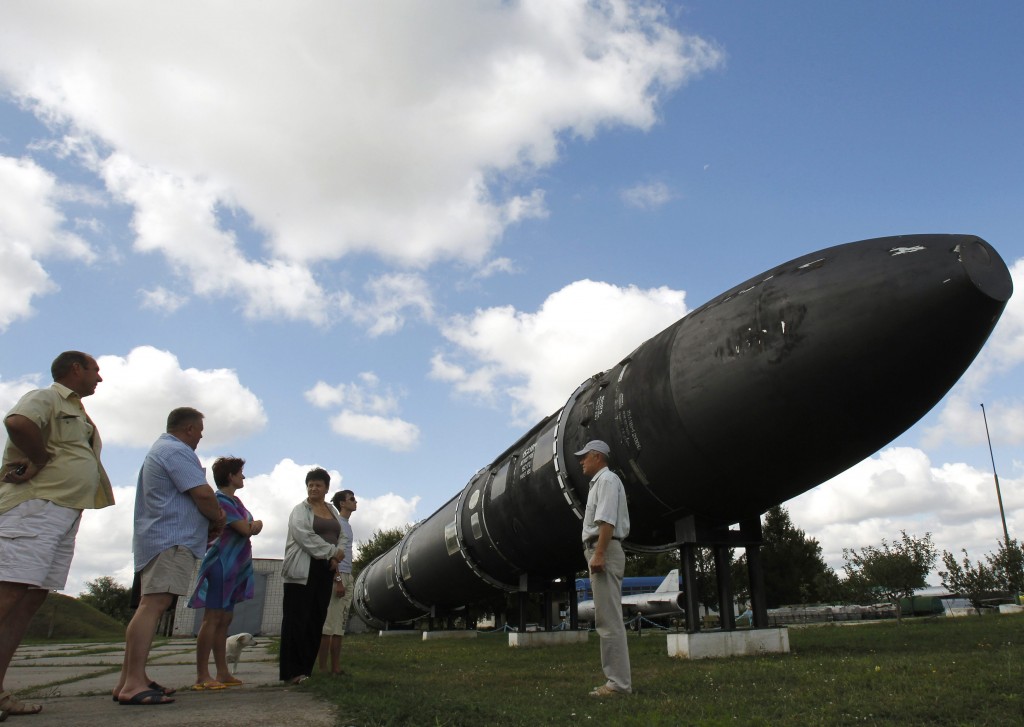Russia to Create “Son of Satan” Missile
Ariel Cohen /
Last week, General Sergei Karakayev, Commander of the Strategic Rocket Forces, announced plans for a new heavy intercontinental ballistic missile (ICBM) to go into production as soon as 2018. He emphasized that the new missile would be capable of penetrating the NATO missile shield Russia dislikes so much. The new delivery system will carry a five-ton payload into orbit, almost as much as its predecessor, the infamous R-36m/SS-18 ICBM known by its NATO designation, “Satan.” Like “Satan,” “the Son of Satan” will use highly poisonous liquid propellant.
This escalation comes after President Obama once again hailed his Russia policy. The Russian announcement delivers a blow to the New Strategic Arms Reduction Treaty (New START), which limited U.S. and Russian warheads. An Obama Administration “reset” policy, New START traded real concessions to Moscow for promises of imaginary cooperation in arms control, in a vain effort to reach President Obama’s dream of a nuclear-free world.
As NATO countries are reducing their military budgets in response to economic crises, the Russian announcement is a sad case of jingoism: The U.S. has not deployed or tested a new nuclear weapons platform since the Reagan Administration. Nevertheless, Russia continues to treat the U.S. as its “principal adversary,” despite the proclaimed “reset” in relations.
The Kremlin confirms that it is developing the new rocket in response to the U.S. missile shield. Russian President Vladimir Putin claims that the missile defense upsets the Cold War-style strategic balance and that Americans “are obsessed with the idea of providing themselves with absolute invulnerability.” He promises that no expense will be spared in restoring that balance.
The White House’s assurances that the shield is deployed against the developing nuclear and missile programs of Iran and North Korea are met by repeated demands from Russian diplomats for severe “qualitative and quantitative” limitations that would render the system weak, defenseless, or moot.
My colleague, Baker Spring, notes that “this is in line with Russia’s longstanding policy of creating a multi-polar environment and actively working against U.S. interests all over the world.” Russia is spending more than $700 billion on military modernization, including a missile which, according to Col. General Viktor Yesin, has “a payload four times bigger than that of the Yars missile.” The Cold War rhetoric and price tags indicate a belligerent Kremlin unable or unwilling to fulfill promises of a “reset.”
This demonstrates the White House’s naiveté. The Obama Administration has not learned from Russia’s recent threat to relocate its short-range, nuclear capable Iskander rockets closer to borders with Poland and other NATO countries, or from the announcements of high-ranking Russian military personnel that faithfully represent the political will of the Russian national leadership.
The latest announcement may be just another bargaining chip. It is possible that the missile will never reach production. The Russian military industrial complex is plagued with corruption and depends on imported foreign components. Its declining technical expertise and quality control make a project of this magnitude a costly endeavor that the Russians might be happy to scrap in exchange for significant limits on the missile shield. Yet, this should not be taken for granted. If anything, it is heavy ICBMs with multiple warheads that the Russians know how to produce.
The last thing the U.S. should do is abandon the ballistic missile defense program that provides defense against real threats to national security. The U.S. and its allies have the right to disable missiles fired at them and should not cede this right in the pursuit of a “getting to zero” fantasy.
Like the U.S., Russia should put behind the Cold War mentality that hobbled the Soviet Union with massive military expenditures. Rather, Moscow should seek to develop a mutually beneficial relationship, including countering the threats from North Korea and Iran. The Kremlin should recognize that economic challenges, Islamist threats from Afghanistan to Yemen, and America’s pivot to the Pacific mean that conflict with Russia will probably remain the legacy of the 20th century.

